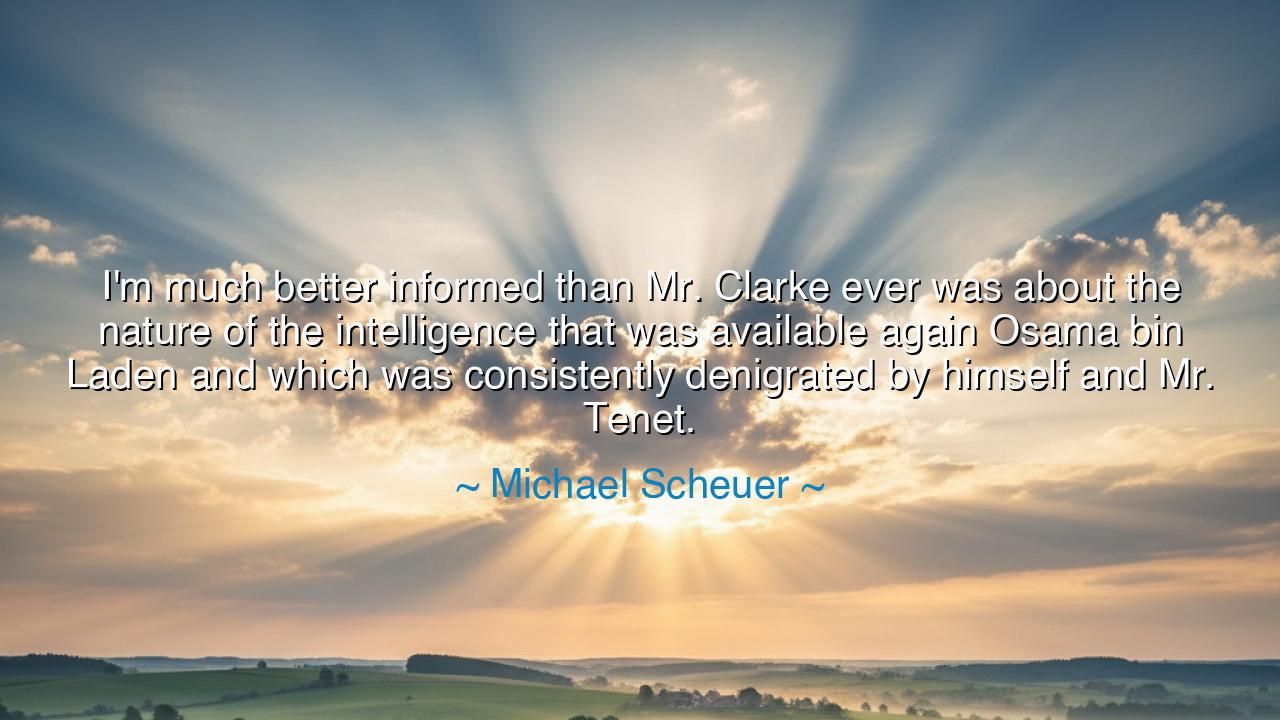
I'm much better informed than Mr. Clarke ever was about the
I'm much better informed than Mr. Clarke ever was about the nature of the intelligence that was available again Osama bin Laden and which was consistently denigrated by himself and Mr. Tenet.






In the unfolding drama of history, there are moments when the truth comes to light only through the relentless pursuit of clarity, even in the face of opposition. Michael Scheuer’s words, “I'm much better informed than Mr. Clarke ever was about the nature of the intelligence that was available against Osama bin Laden and which was consistently denigrated by himself and Mr. Tenet,” reflect the frustration and disillusionment felt by those who possess knowledge but find their voices silenced by those in positions of power. Scheuer’s statement speaks not just to the specific case of intelligence on Osama bin Laden, but to the deeper principle that, in times of crisis, truth is often obscured by political agendas and miscommunication. His words urge us to consider how the pursuit of knowledge and the dissemination of intelligence can be hindered by the very structures meant to protect us.
In the ancient world, the transmission of knowledge and wisdom was an act of profound responsibility. Socrates, perhaps the greatest of philosophers, constantly questioned the established authorities of his time. He understood that truth was often buried beneath layers of societal norms and political interests. Just as Socrates was sentenced to death for daring to speak uncomfortable truths about Athenian society, Scheuer’s words highlight a modern reality where truth—in this case, intelligence about terrorism—can be suppressed for fear of disrupting the prevailing narrative. Socrates taught us that the pursuit of truth often requires courage in the face of powerful opposition, a lesson Scheuer echoes as he confronts the dismissal of critical intelligence.
The Roman Empire, too, witnessed the tension between those in power and those who held the knowledge. Cicero, the Roman orator and statesman, often found himself at odds with the ruling class as he sought to expose corruption and uphold justice. His calls for the truth about political conspiracies were frequently ignored or dismissed by those in power, just as Scheuer suggests intelligence that could have prevented 9/11 was ignored or downplayed by key figures in the U.S. government. Cicero’s persistence in the face of adversity reflects the wisdom that those who speak the truth often find themselves not only battling the enemy but also the inertia of a society that is reluctant to face uncomfortable realities.
Consider the story of Winston Churchill during the Second World War, when he had access to critical intelligence about Nazi intentions. Despite the evidence of looming threats, Churchill’s warnings were often dismissed or underestimated by some in his government. Churchill, however, stood firm, believing that the truth about Nazi aggression must be shared and acted upon, even if it went against the prevailing optimism of the time. Churchill’s insistence on confronting the truth—no matter how difficult or unpalatable—eventually became one of the defining characteristics of his leadership. Like Scheuer, Churchill understood that knowing the truth and acting on it was far more important than remaining comfortable in denial.
Scheuer’s frustration with the dismissal of intelligence about Osama bin Laden is not only about the failure to prevent an attack but about the larger failure of a system that does not listen to those who hold the necessary information. The lesson here is clear: when those with knowledge are ignored or discredited, society places itself at great risk. In our personal lives, we must ask ourselves how often we ignore or discredit voices of warning or advice that may challenge our own comfortable perceptions. Just as Scheuer highlights the dangers of ignoring vital intelligence, we must recognize that true progress comes not from ignoring difficult truths, but from listening to the voices that challenge us to face them head-on.
In the end, the pursuit of truth is a never-ending battle—not only against external enemies but against the forces within society that wish to obscure or ignore it. Whether in politics, business, or personal decisions, we are often confronted with the choice to either speak truth or remain silent for the sake of convenience. Scheuer’s words challenge us to prioritize knowledge and action over comfort and status quo. To confront uncomfortable truths is to act with integrity, even in the face of resistance or opposition. We must strive to ensure that, like Churchill or Socrates, we do not allow truth to be suppressed by the forces of ignorance and fear. Instead, we must have the courage to confront it and the wisdom to act upon it, for only then can we ensure the safety and progress of our communities.
Therefore, in our own lives, let us take the lesson of Scheuer's words to heart: seek out the truth, even when it is difficult, and honor those who carry the knowledge necessary to create positive change. In a world that often rewards comfort over clarity, may we have the courage to challenge the narratives around us and embrace the truth, no matter the cost. Just as in the stories of Socrates, Cicero, and Churchill, the truth we choose to uphold will shape not only our own destinies but the fate of those we lead. Wisdom requires not just the courage to speak the truth, but the determination to act upon it, for it is in the pursuit of truth that we find the path to justice and peace.






AAdministratorAdministrator
Welcome, honored guests. Please leave a comment, we will respond soon